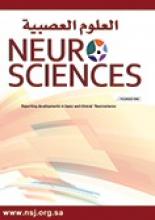Abstract
The ketogenic diet is a high-fat, low-carbohydrate, and adequate-protein diet for the treatment of intractable seizures in children, initially introduced in 1921 to mimic the biochemical changes associated with fasting. The diet is individually calculated and rigidly controlled, requiring a comprehensive medical team approach. Although there are adverse, as well as, beneficial effects, several studies have proved its tolerability and efficacy in children with medically refractory epilepsy. Children must be carefully selected, monitored, and followed, and the parents must be committed. The division of Pediatric Neurology at King Faisal Specialist Hospital & Research Center in Jeddah is one of very few centers that provide this treatment option in the Middle East. Over the last 2 years, 8 children with intractable epilepsy were placed on the ketogenic diet in our center. Overall, 38% (3/8) reached accepted efficacy (>50% seizure reduction), which is lower than the 50% efficacy in published literature. Many issues and problems arose in the provision and compliance with the ketogenic diet, many of which were unique to our culture. It is critical that this treatment is provided to highly selected children with committed parents.
- Copyright: © Neurosciences
Neurosciences is an Open Access journal and articles published are distributed under the terms of the Creative Commons Attribution-NonCommercial License (CC BY-NC). Readers may copy, distribute, and display the work for non-commercial purposes with the proper citation of the original work.






